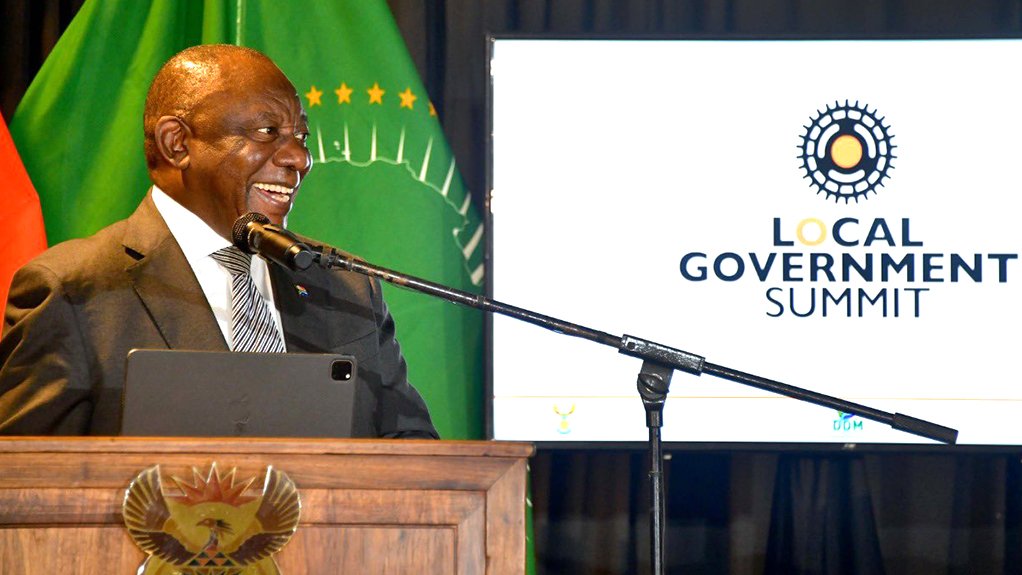IF government is to harness the momentum of economic recovery that new investments signal, local government must be strong, efficient, capable and well-run.
This was according to President Cyril Ramaphosa, who, on Wednesday, addressed day two of the Local Government Summit, hosted the Department of Cooperative Governance and Traditional Affairs.
He said as the country grappled with poverty, unemployment and inequality, it was vital that government attended to local economic development in a more focused and practical manner.
“When there is a growing, dynamic economy we have the fiscal space to expand the provision of services that improve our people’s lives. When there is more investment and business expansion, jobs are created, livelihoods are supported, and the benefits circulate in local areas,” he said.
Accelerating economic growth, attracting investment and creating jobs must be at the centre of the efforts of all spheres government, he stated.
Two weeks ago Ramaphosa was part of an investment oversight visit to KwaZulu-Natal, where he attended the launches of expansion projects by automotive component manufacturer Hesto Harnesses and paper products company Sappi.
Both of these were the fulfilment of commitments made at one of South Africa’s Investment Conferences and these investments were supporting job creation, enterprise development and localisation, he said, while making sure that products were sourced in local areas to promote local entrepreneurs.
He said this would inject millions of rands into local economies.
“In one case they [investors] were able to quantify it – so many small and medium enterprises are going to be part of our economic or financial ecosystem and so many other companies are going to provide us with components, locally produced, that are going into a final product that we make,” he explained.
Over the past two months, Ramaphosa also attended similar such launches by Ford Motor Company, Isuzu, Anglo American, Corobrik, Sandvik, Netflix, Consol Glass and others.
He pointed out that these business expansion projects were taking place in towns and metros, where the country’s citizens live and where the projects were needed most.
“When these domestic investors and multinationals are making decisions on where to bring or expand their investments, one of the first factors they consider is whether there is an enabling environment in that locality. They look at whether they can receive the necessary approvals and permits on time. They look at the quality of the provision of water, electricity, sewage and refuse removal. If they are not satisfied that their needs will be met, they choose to invest somewhere else,” said Ramaphosa.
INSTABILITIES IN GOVERNANCE STRUCTURES
As government works to promote local economic development, the role of the District Development Model must be considered, the President stressed.
He said this integrated, multidisciplinary approach to government planning and implementation must, in the end, translate into local economic development that changed lives at a household level.
He wanted mayors and councillors to be deeply involved with the promotion of local economic development, and stressed that this should not be a singular task for mayors, but rather an integrated one.
“We should not leave it to consultants to devise our economic development plans and expect that they will be implemented on their own. Mayors and councillors need to drive the process from start to finish,” he said.
Ramaphosa noted that South Africa must embark on a course correction to advance the principle of people-centered local government, by focusing and committing leadership across all municipalities with stronger strategic relations with the private sector and other social partners.
He said government must prioritise fiscal sustainability, sound municipal financial governance and eliminate corruption.
“Municipalities need to focus on the imperative of revenue collection to ensure that there are sufficient funds available to fulfil their functions. In addition to the jobs it creates and the community development it enables, vibrant local economic activity strengthens the financial position of municipalities,” he said.
He further explained that municipalities would then be less dependent on grants from the national fiscus and they would be empowered to pursue the interests of residents with greater focus.
“But if we are to build these ideal municipalities, we need to address the instability within governance structures and processes,” he admitted.
Engineering News

